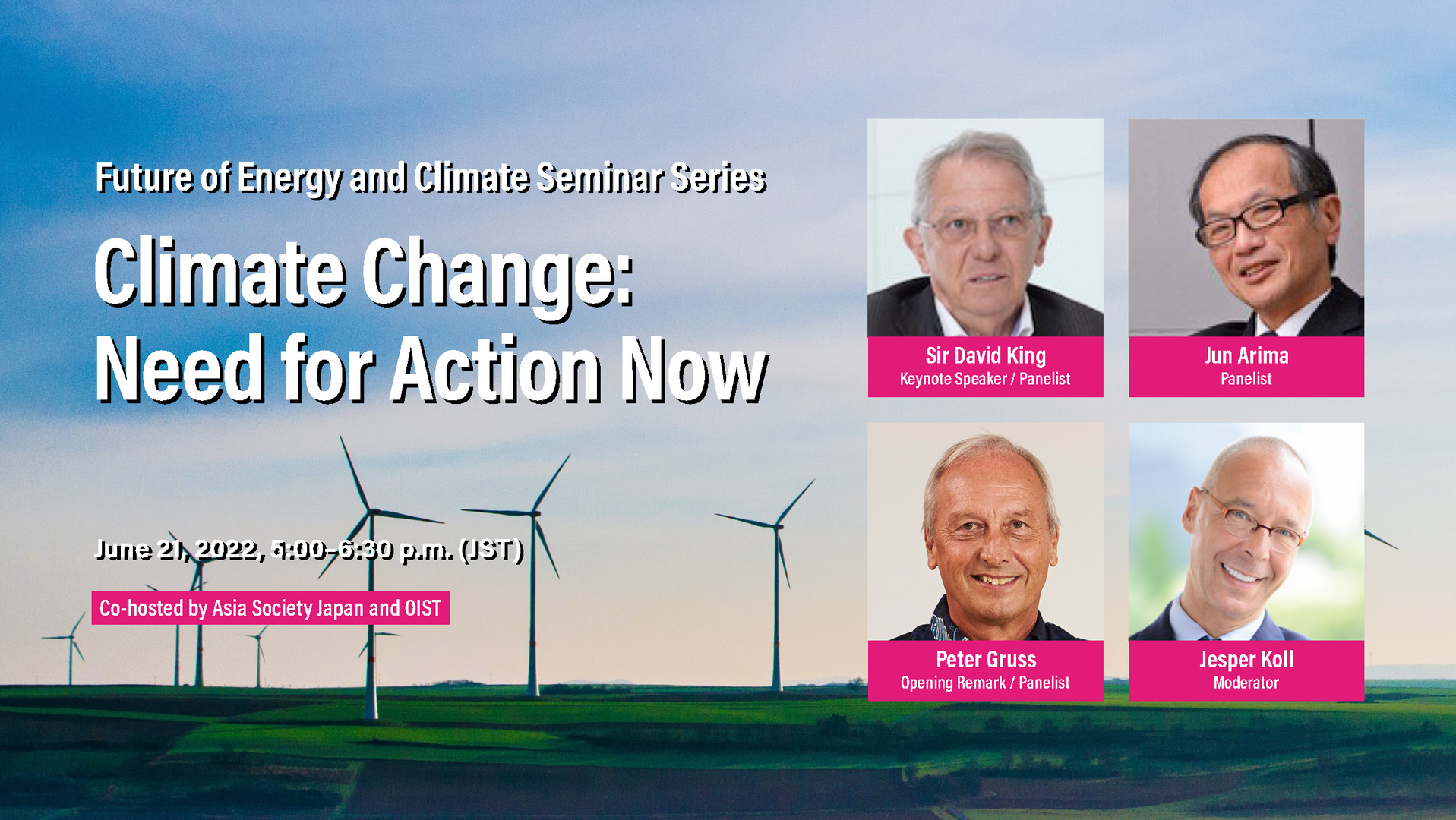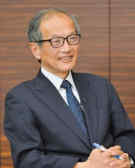Seminar 2 - June 21 17:00 JST (June 21 9:00 BST)

Register HERE>> #2 OISTxASJ Future of Energy & Climate Seminar Series
OIST and ASJ are proud to present our second Future of Energy and Climate Seminar Series, featuring two renowned energy and climate experts, Sir David King and Professor Jun Arima. Sir David King, formerly UK Government’s Chief Scientific Adviser and Foreign Secretary’s Special Representative on Climate Change, will give the keynote speech, “Climate Change: The Need for Action Now”. Prof. Jun Arima, formerly in charge of energy and environment negotiations for Japan’s Ministry of Economy, Trade, and Industry (METI) will present a panel session opening talk, “Obstacles in the way of 1.5-degree pathway”. We will have a networking session for onsite participants after the Q&A.
We look forward to your participation!
“Climate Change: The Need for Action Now” by Sir David King
Faced with accelerating global impacts of climate change, Sir David King will discuss how human civilisation and our planet can still win back the chance of surviving and thriving. Climate Repair offers a scalable, safe recipe for future climate stability. The strategy applies three immediate climate repair measures: 1) Reduction in emissions, to achieve very rapid progress to close to zero greenhouse gas emissions; 2) Removal of excess greenhouse gases from the atmosphere at scale; 3) In order to buy time to achieve the first two objectives, Repairing the Arctic Circle region by refreezing the Arctic Sea surface during the polar summer. But time is not on our side: Action is needed NOW.
“Obstacles in the way of 1.5-degree pathway” by Prof. Jun Arima
COP26 adopted the ambitious Glasgow Climate Pact. However, an ambitious statement does not necessarily lead to equivalent actions. Contrary to the IEA’s vision on Sustainable Recovery, the recovery process from COVID-19 has resulted in the highest CO2 emissions in 2021. Energy crisis since last autumn is being further exacerbated by the Ukraine war. On one hand, reducing import dependence on Russian energy could accelerate the clean energy transition. On the other hand, substituting energy supply from Russia could necessitate additional fossil fuel investment which is incompatible with the 1.5 degree pathway. There is marked difference between developed and developing countries as to priorities among 17 SDGs, and SDG13 (climate action) is not the top priority in developing countries. Competition over LNG supply between Europe and Asia could further raise gas prices and discourage fuel switching in Asian developing countries from coal to natural gas. More fundamentally, “divided world” after Russia’s invasion of Ukraine war would not be conducive to global collaboration in combatting climate change. What could we do to sustain climate action amid various adverse environments?
<Event Details>
Tuesday, June 21, 2022 at 17:00 JST / 9:00 BST
(JST / BST)
17:00 / 9:00 Welcome by Mr. Jesper Koll, Monex Group Japan Global Ambassador
Opening Remarks by Dr. Peter Gruss, OIST President & CEO
17:05 / 9:05 Keynote Speech “Climate Change: The Need for Action Now”
Sir David King
Emeritus Professor of Chemistry and Founder & Chair, Centre for Climate Repair, University of Cambridge
17:35 / 9:35 Panel Session Opening Talk
Prof. Jun Arima
Project Professor, Graduate School of Public Policy, University of Tokyo
17:50 / 9:50 Panel Discussion by Sir David King, Prof. Arima, and Dr. Gruss
Moderated by Mr. Koll
18:10 / 10:10 Q&A session
18:30 / 10:30 Networking session (for onsite participants only)
19:30 / 11:30 End of the event
Venue: International House of Japan B1 Iwasaki Koyata Memorial Hall
Access Map: Map/Access | IHJ (i-house.or.jp)
Fee: 5,000 yen for in-person guests (Free for virtual participants)
*Please pay by cash at the reception. A receipt will be issued.
Contact: OIST Tokyo Office: tokyo-office@oist.jp
Asia Society Japan Centre: info.japan@asiasoicety.org
<Speakers' Bios>
Professor Sir David King is Emeritus Professor of Chemistry, University of Cambridge; Founder and Chair of the Centre for Climate Repair in the University; Chair of the Climate Crisis Advisory Group; an Affiliate Partner of SYSTEMIQ Limited; Senior Strategy Adviser to the President of Rwanda and founder member of the Clean Growth Leadership Network, CGLN. He served as Founding Director of the Smith School of Enterprise and the Environment at Oxford University, 2008-2012, Head of the Department of Chemistry at Cambridge University, 1993-2000, and Master of Downing College Cambridge 1995-2000.
He was the UK Government Chief Scientific Adviser, 2000-2007, the Foreign Secretary’s Special Representative on Climate Change, 2013-2017, and Chair of Future Cities Catapult, 2012-2016.He has travelled widely to persuade all countries to action climate change. He initiated an in-depth risk analysis approach to climate change, working with the Governments of China and India in particular, and initiated a collaborative programme, now known as Mission Innovation, to create a £23bn pa research and development international exercise, which involves 22 countries and the EC, to deliver all technologies needed to complete the transition into a fossil-fuel-free world economy.
In June 2021, he launched the Climate Crisis Advisory Group, CCAG, a global team of 15 climate experts drawn from 10 countries who give monthly public (virtual) meetings on their work,
available to all. CCAG are able to respond, with authority and quickly, to current needs in the process of protecting our future, with advice on the actions needed to deliver this effectively and safely.
He was born in Durban, educated at St John’s College Johannesburg and at Witwatersrand University, graduating in Chemistry and a PhD in physical chemistry.
As Govt Chief Scientific Adviser he raised the need for governments to act on climate change and was instrumental in creating the British £1billion Energy Technologies Institute. He created an in-depth futures process which advised government on a wide range of long-term issues, from flooding to obesity. He was Member, the President’s Advisory Council, Rwanda, and Science Advisor to UBS, 2008-12 .
He has published over 500 papers on surface science and catalysis and on science and policy, for which he has received many awards, medals etc. and 23 honorary degrees from universities around the world.
Elected Fellow of the Royal Society in 1991; Foreign Fellow of the American Academy of Arts and Sciences in 2002; knighted in 2003; made “Officier dans l’ordre national de la Légion d’Honneur” in 2009.
Oct 2021
Jun Arima
Education: University of Tokyo (graduated in 1982, Bachelor in Economics)
Career History:
1982: Joined MITI (Ministry of International Trade and Industry)
1996-1999: Counsellor, Permanent Delegation of Japan to the OECD (Energy Advisor)
1999-2000: Director, Energy Efficiency Policy Coordination, New Energy Policy Coordination, Energy and Environment Office, ANRE (Agency of Natural Resources andEnergy), MITI
2001-2002: Director, International Energy Strategy, ANRE/METI (Ministry of Economy, Trade and Industry)
2002-2006: Head, Country Studies Division, IEA (International Energy Agency)2006-2007: Director, International Affairs Division, ANRE/METI
2007-2008: Counsellor, International Energy Negotiation, ANRE/METI2008-2011: Deputy Director General for Global Environmental Affairs, METI2011-2015:Director General, JETRO (Japan External Trade Organization) London
2015-: Professor, Graduate School of Public Policy, University of Tokyo
2021: Project Professor, Graduate School of Public Policy, University of Tokyo
Project Leader, 21stCentury Public Policy Institute, Consulting Fellow Research Institute of Economy, Trade and Industry (RIETI), Distinguished Senior Research Fellow, Asia Pacific Institute of Research (APIR), Senior Policy Fellow, Economic Research Institute of ASEAN and East Asia (ERIA), Lead Author of the IPCC 6thAssessment Report
His publication includes “Energy Policies of the IEA Countries” (2003-2006editions), “Memoir of the Kyoto Protocol” (2014), “Truth of Global Warming Negotiation–Economic War on National Interests”(2015), “Global Warming Countermeasures with Pragmatism–Paris Agreement and Thereafter” (2016), “Trump Risk–America First and Global Warming” (2017),“Policy Recommendations by the Quadripartite Commission on the Indian Ocean Regional Security” (Chapter 2) (2017 Sasakawa Peace Foundation), “Japan’s Energy Conundrum” (Chapter 11) (2018 Sasakawa Peace Foundation), “Finding a Viable Path for Reducing GHG Emissions2 (2019 King Abdullah Petroleum Studies and Research Center (KAPSARC), “Eco-fundamentalism as a Grist to China’s Mill” (2021), “Eco-fundamentalism will ruin our country” (2021)





